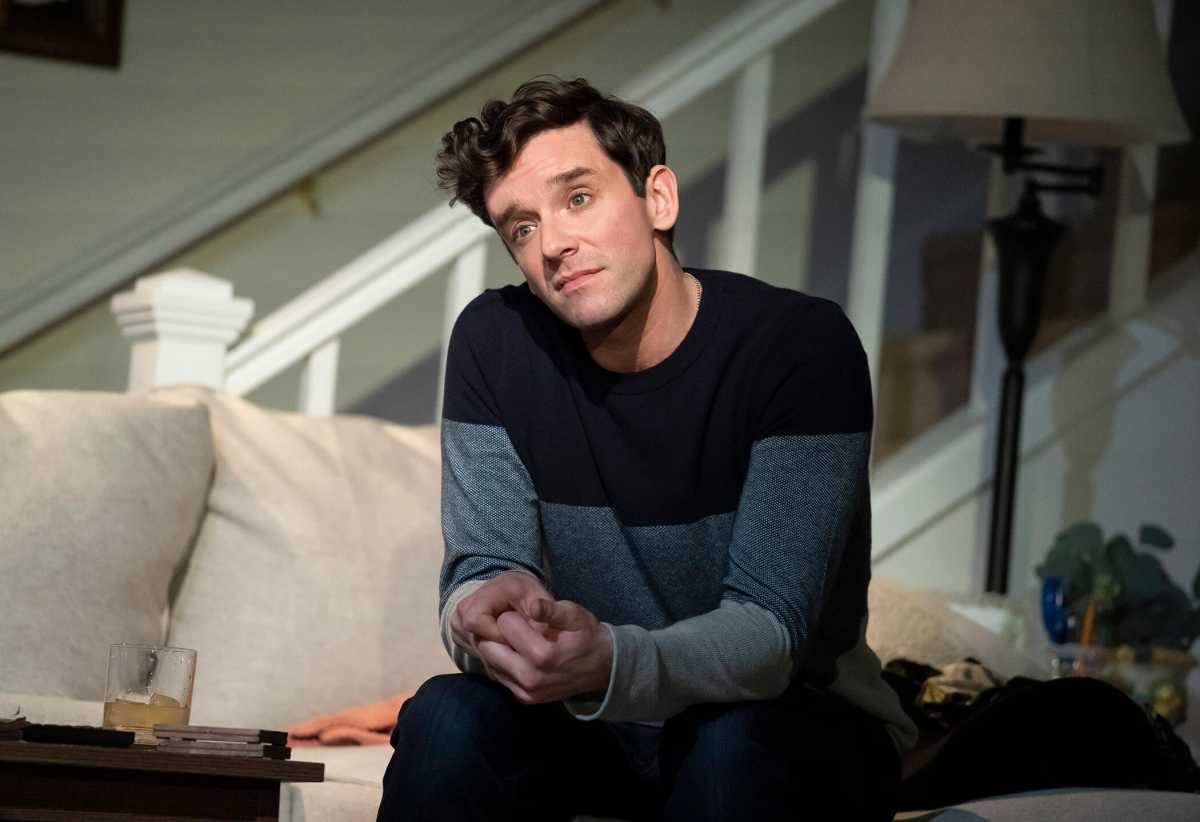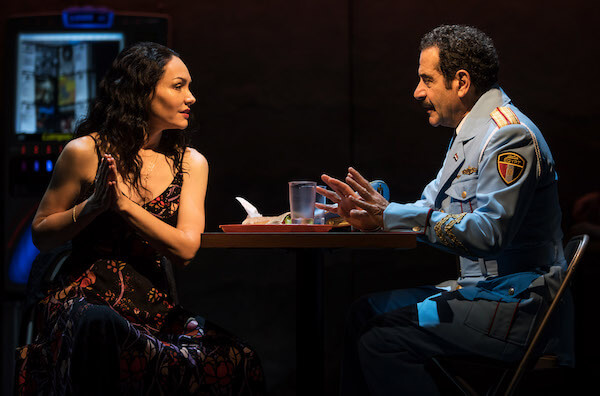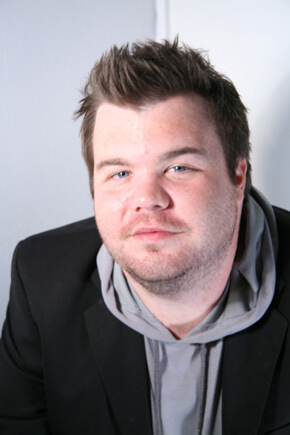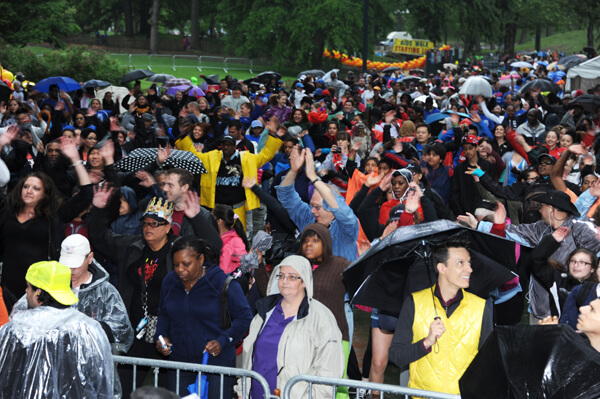It is only in the final 10 ten minutes that Bess Wohl’s new comedy “Grand Horizons” settles down and gives us the kind of complex and affecting humanity that made her previous work, particularly the brilliant “Small Mouth Sounds,” so powerful. For the two hours leading up to that point, however, the piece is a largely disorganized comedy in the vein of lesser Neil Simon or a generic sitcom. The broad strokes demands of this type of comedy are at odds with Wohl’s deeper, more sympathetic insights, which is why the trite sex jokes, formulaic plotting, and shallow characters are more tedious than tickling.
After a 50-year marriage, Nancy tells her husband Bill that she wants a divorce. Their two sons — one married and expecting a child, the other gay — arrive and chaos ensues. Buried secrets are told, old resentments aired, affairs are revealed as this collection of venal and selfish people knock about Nancy and Bill’s unit in a generic retirement community. The structure is equally tired and predictable as each child gets a scene with each parent, Bill’s current girlfriend, Clara, has a scene with Nancy, and so on. Yet, Wohl being who she is, there are glimmers of her inherent talent for touching deeper elements of human experience, such as when the gay son, Brian, has to confront why he’s alone or that his choices as a high school drama teacher have roots in the alienation he felt in his family. When Nancy tells Brian that she’s had an affair for many years, she says, “I will be seen as a full person,” and that’s the best moment of the play — in its simplicity it says so much about the relationship between parents and children. Those moments are a tonic in the otherwise manic goings on.
The high-power cast, including James Cromwell, Ben McKenzie, and Ashely Park, does what they can with these moments, though director Leigh Silverman doesn’t give them much and the comedy often falls flat. Jane Alexander as Nancy has real moments when the conflict and sadness of the character resonate. Priscilla Lopez gives a funny and heartfelt turn as Clara, a character whose primary function is to serve as a foil for the more contained Nancy. Michael Urie, as usual, is the best performance in the piece. Aside from an awkward scene with a potential trick (Maulik Pancholy), his role is the least comedic, and he fully captures Brian’s unsettled sadness and his outsider status in the family. It’s a performance with depth and nuance that shows what this play might have been.
With such dynamic Black playwrights as Suzan-Lori Parks, Jordan E. Cooper, and Jeremy O. Harris, to name just three, writing contemporary plays about race, Roundabout’s staging of Charles Fuller’s “A Soldier’s Play” seems curious. Whatever one thought of “Slave Play” or “Ain’t No Mo,” those two shows from last season were undeniably risky, visceral, and timely in their exploration of race in America. Despite the fact that Fuller’s 1981 play won the Pulitzer Prize for drama, the current production is largely unremarkable.
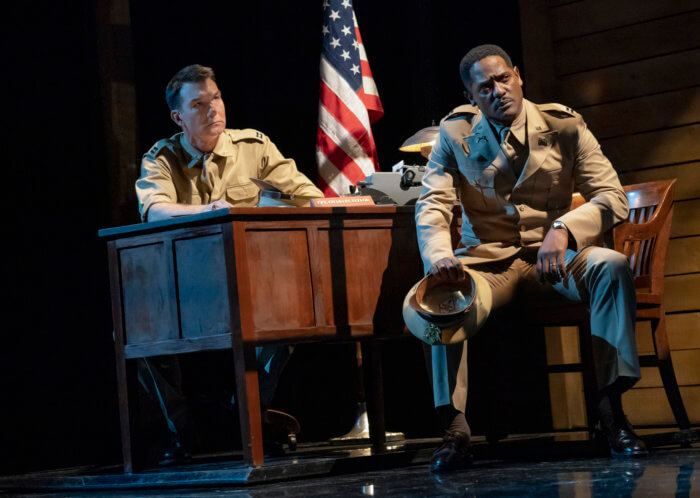
Yes, there are issues of race, racism, and, in particular, life in a segregated, all-Black base in the South during World War II as the soldiers wait to be deployed. In Kenny Leon’s staging, though, these issues are muted, and the play is reduced to a kind of whodunnit procedural, such as one can find on TV any time. Nearly 40 years since its debut at the Negro Ensemble Company, the play feels dated as the plotting overwhelms the deeper issues.
The story surrounds the murder of Sergeant Vernon Waters at Fort Neal in Louisiana in 1944 and the efforts of the outside lawyer Captain Richard Davenport to find the killer. While the initial assumption is that the Klan was responsible, as Davenport digs into the case, often at odds with the white Captain Charles Taylor, who wants a quick resolution and is concerned about his men, it becomes clear that there is much more going on. Everyone comes under suspicion, including two white officers who had means and opportunity, as these tales go. In a series of flashbacks, we see that Waters was crazed and determined that Black soldiers who didn’t reflect well on his race should be marginalized, severely punishing those who did not live up to his ideal. Waters’ passion, bordering on psychosis, is at moments understandable given the context of the times, yet his the extreme violence of his temperament made life miserable for his recruits. He busts one man down to private for a small infraction, and he tortures a gentle solider with an unfair accusation that drives him to a desperate act. Themes of toxic racism, inherent bias, and fear play out as each of the soldiers is interrogated, but the plodding nature of the staging mutes the emotional impact.
The company is very good, though the secondary characters are devices that are for the most part merely sketched. Of the principals, Jerry O’Connell is sympathetic as Taylor, the white officer in charge of the base. Blair Underwood, however, is largely wooden and mechanical as Davenport. There’s a moment when he appears without a shirt, which prompted catcalls from the audience, and served no other purpose than to show that Underwood is still in excellent shape in middle age — an unnecessary display of vanity out of sync with the character. David Alan Grier as Waters gives an incomplete performance that is largely shouting and mannerisms and never convincingly conveys the character’s tormented complexity.
“A Soldier’s Play” was written at a time when there was still “Black theater,” as there was “gay theater.” In the ensuing decades, in a more progressive time, those modifiers have dropped away. That’s a step in the right direction, but as with last year’s revival of “Torch Song,” time can blunt political impact, and the earnest, important works of the past may not deliver the punch they once had.
“Goy Friendly,” the new piece from Ashley Blaker bills itself as stand-up comedy. Blaker does stand for the entire thing, so there’s that. As for comedy, well, not so much. Rather, it’s a tiresome lecture about the traditions of Orthodox Jews wrapped in few comic one-liners, cultural clichés lifted from other comics, and pop references from the 1980s. The British Blaker says his purpose in doing this is to introduce non-Jews (goys) to Orthodox ways, but despite a bit of English charm, his pedantry, almost total lack of timing, and often flat delivery reduce this to the level of a high school diversity assembly.
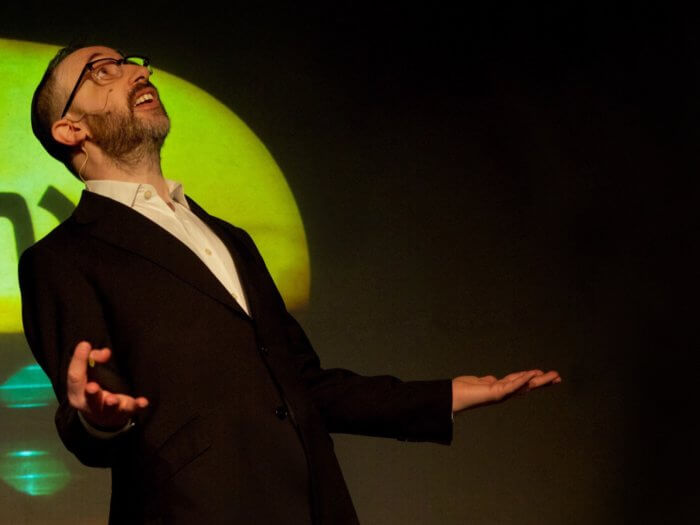
The cold heart of the patter is a review of the original Ten Commandments, with gags about being attracted to an ox, and Blaker’s new version for Orthodox Jews. Blaker also talks about his Muslim friend with whom he teamed up to do comedy, noting they share the same quirks and that both religions include very funny traditions. Blaker pokes fun at the traditions, but goes further to actually demean them without providing any context for why they exist in the first place.
He also has three anti-gay gags, including the false assertion that the Torah bans gay sex. The jokes do nothing to dispel the idea that among the ultra-Orthodox, homophobia is rife. And then Blaker doubles down on the whole mess by showing a slide of a group of rabbis and suggesting no one could be sexually attracted to them anyway.
There is surely hypocrisy in Blaker’s revised commandment that “thou shalt avoid all media.” What is the theater if not a medium?
The most ecumenical aspect of the show is the acknowledgment that the demands of religion often prove flexible enough to satisfy the earthly ego. At the end of “Goy Friendly,” Blaker says that he stays in the Orthodox Jewish life because he loves it — even if he never gives us reason to believe him. Surely, his love is about more than the correct, rimmed skull caps, binding one’s arms in leather, and finding a Shabbos goy.
I have to give him this, though. “Goy Friendly” does give one first-hand experience of that other tired trope of Jewish experience: suffering.
GRAND HORIZONS | Second Stage Theater at the Helen Hayes Theater, 240 W. 44th St. | Through Mar. 1: Tue.-Thu. at 7 p.m.; Fri.-Sat. at 8 p.m.; Wed., Sat. at 2 p.m.; Sun. at 3 p.m. | $79-$199 at 2st.com or 212-541-4516 | Two hrs., 10 mins, with intermission
A SOLDIER’S PLAY | Roundabout Theatre Company at the American Airlines Theatre, 227 W. 42nd St. | Through Mar. 15: Tue.-Sat. at 8 p.m.; Wed., Sat. at 2 p.m.; Sun . at 3 p.m. (with some 7 p.m. evening curtains)| $59-$299 at roundabouttheatre.org or 212-719-1300 | One hr., 50 mins, with intermission
GOY FRIENDLY | SoHo Playhouse, 15 Vandam St. at | Through Feb. 23: Mon.-Thu., Sun. at 7:30 p.m.; Sun. at 5 p.m.; Wed. at 3 p.m. | $50 at sohoplayhouse.com or 212-691-1555 | One hr., 20 mins, no intermission

